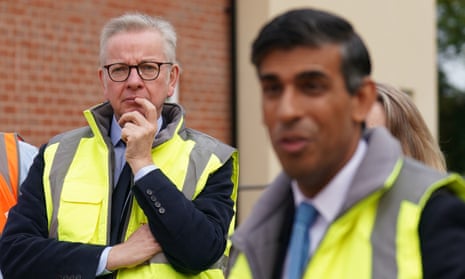Less than a fifth of the projects approved by Michael Gove to improve towns across England have been completed, the government has admitted, in the latest sign of the problems facing his levelling up agenda.
Responses from Gove’s department to freedom of information requests show that fewer than 20% of the projects sanctioned under the £3.6bn towns fund were on track to be finished by the end of February. Fewer than half will have been completed by the next election, even if it is held in November, the figures show.
The data is the latest example of how difficult the Conservatives have found it to meet the promises the party made at the last election to use post-Brexit freedoms to reduce regional inequality in England.
The Guardian revealed last year that councils were having to scale back or freeze levelling up projects because of soaring costs and that Gove’s department was handing back nearly £2bn of housing money after struggling to find projects to spend it on.
Jack Shaw, a local government expert who uncovered the figures, said: “Given this was a flagship policy priority at the last general election, the expectations on the government to deliver new infrastructure in places that have historically been ignored were high.
“Inflation and interest rates have prevented some projects from making progress, but the government has also failed to respond to those changes and has instead asked places to reduce their ambition. Come the election, current evidence suggests the government will have failed its pledge to ‘level up’ communities.”
The towns fund was announced immediately after the last election, with Gove promising it would give “underinvested towns the much-needed funding and support to get going on their long-term plans”.
The fund was a key plank in his levelling up plan to improve infrastructure outside London and major cities. Projects include a new investment zone around Blackpool airport, an industrial centre in Grimsby and the regeneration of Bedford’s train station.
Since then, however, high inflation has eaten into large parts of Gove’s budget and made it increasingly difficult to complete building projects. The Guardian reported last year that at least £500m had been lost from levelling up projects because of rising costs, with leisure buildings, high streets, museums and public spaces all being hit.
Many councils have stalled or reduced their plans as a result of higher costs, and some say they have found it a lengthy and bureaucratic process to get Whitehall officials to approve their alterations to the original plans.
A report by Thurrock council last November showed the authority struggling under the pressures of higher inflation.
The council was due to spend £22.8m on improving Tilbury town centre, including a new community hub, a youth centre, new cycle paths and a new jetty. In November local officials warned there had been “significant cost price inflation” since the plans were submitted, forcing them to review the entire scheme to make sure the council did not overspend.
The report added: “There has been a significant delay in the confirmation of the business cases due to the need for further reassurance and assessment work on governance by [the levelling up department] and the commissioners.”
after newsletter promotion
The figures unearthed by Shaw show that out of 973 towns fund projects, only 154 are due to have been completed by the end of February. By the end of November, that figure rises to 385, just 40% of the total.
More than 170 projects are due to finish in March 2026, the official deadline given by Gove for spending all the towns fund money. A few are scheduled for completion after that date, but officials indicated this could be because they were relying on other sources of funding to finish the projects.
The Department for Levelling Up, Housing and Communities said: “All of the money which was allocated from the towns fund is on track to be spent by March 2026 as planned, with more than 100 projects already completed. The rate at which projects are being completed is entirely consistent with the delivery timeframes we have set out.”
Labour said the problems were a further indication of the issues with ministers in Westminster trying to dictate how local authorities across the country spend their money.
Justin Madders, the shadow levelling up minister, said: “The Tories’ begging-bowl approach to levelling up forces leaders to spend time, effort and taxpayers’ money bidding for uncertain and tightly ringfenced pots of money. This sticking-plaster approach won’t give local leaders the tools they need to drive growth in their local area and live up to their best potential.”
